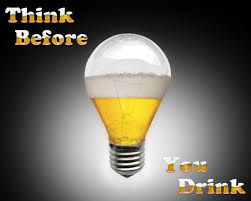
As the Alltech Beer & Food Fair at the convention centre was drawing to a close and the excitement for St Patrick’s Day festival was just starting this reporter decided to go against the grain and explore the non- to low alcohol options at the Alltech fest. Generally I was met with surprise by many of the staff there as not many attendees go to beer fests for non-alcoholic options. But I’m glad to report that brewers are noticing that good profits are to be made from producing low-alcoholic beers especially as the days become longer.
At present the excise tax charged on producing beers between 1.2% and 2.8% is €11.27% per 100 litres produced. This is half the excise charged for beers above that. Beers with alcohol-by-volume (abv) of 0.5% to 1.2% are not charged any excise duty. Despite these low taxes on these low abv products customers are still being charged relatively similar prices to the higher percentage beers. Hence you could see why there might be interest among brewers to avail of this excise duty relief and put these beers out on the market. These low alcohol beers don’t compromise on taste and have a responsible but enough alcohol to wet one’s whistle when out socializing. Going above the 2% mark, it seems to be natural to call these beers session beers but I’m surprised the removal of the word session wasn’t part of the new alcohol bill.
I first started out with a strawberry and raspberry kombucha beverage from the Clocked Out stand. The clocked out range are part of the Station Works Brewery owned by the new giant to the Irish alcohol market Pearse Lyons. Unfortunately the kombucha was only available at the event itself and is not part of their range. As detoxifiers go, this packs quite a punch and I would call for it to be compulsory at events like this for the jaundiced and designated drivers. It has the same mouth feel as a beer with its natural carbonation and since it is made from tea leaves it contains the stimulant caffeine but what really helps is it’s high vitamin and electrolyte content your body is only too happy to take up.
Feather Touch by the Hope Brewery in Kilbarrack, was the first ‘relatively’ low abv that I came across. It was even a bit too high for what I was looking for, but I consider it is worth a shout here. It is a 3.6% New England IPA. New England because that’s the name of the yeast that was chosen by head brewer at Hope, Wim De Jongh. The reason for this particular yeast Wim explains is due to its proclivity to produce fruity flavours. This IPA has plenty of body and definitely one that takes time getting through. But its flavour never lets up and this is partially due to not being pasteurised, as this can affect flavour and why Wim kept above the three mark as Wim explains. “I wouldn’t drink a beer that is lower than 3% and hasn’t been pasteurised. Alcohol protects the drink and it also enhances flavour, you are running the risk with salmonella if you don’t”.
Thornbridge IPA which is available at Porterhouse bars is a relaxing very low abv at only 0.5%. This non-alcoholic beverage is definitely drinkable and enjoyable. It has all the hallmarks of an IPA without the sometimes overwhelming power of them. No compromise is made with this beer as it boasts a hop profile of Cascade and Amarillo. Its other ingredients are your regular ones, barley malt, hops, water and yeast. Surprised to find yeast as an ingredient in it with such low alcohol, but as Rory from porterhouse bars explains “there is such low sugar content in the beer which is why only 0.5% of alcohol is produced and that yeast will normally be part of sugar coming from these ingredients, even a 1L of freshly squeezed orange juice will have this amount of alcohol due to natural yeast on the fruit”.
Leaving the best to last, Blacks of Kinsale have bowled me over with their Night and Day beer hitting that levy-attractive mid-two percent abv market. This beer is light in body, alcohol and mood. This low abv beer has just been released last month. I asked Ronan, head brewer at Blacks, if going below the 3% was a risk they took. Ronan told me the bottled product is pasteurised but the kegs are not. Ronan says the keg is a very safe and sterile environment and one of the contributing factors here is the carbon dioxide pushing oxygen out inhibiting pathogens from surviving. Depending on availability can see this being a pioneer in the market.
By Paul Carton
Online Editor



